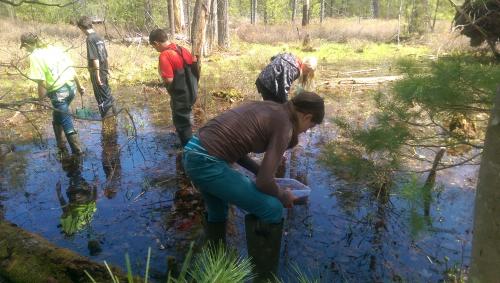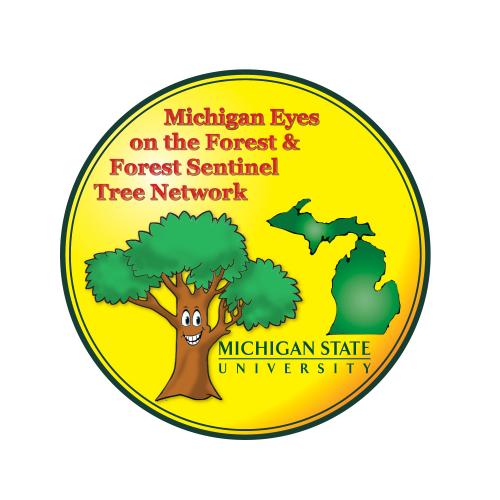Natural Resources
Julie Crick
Natural Resources Educator
MSU Extension Office
500 Lake St.
Roscommon, MI 48653
(989) 275-5043
I am available to give presentations on:
Forest Health
Forest Management to increase forest health
Forest Pests and Diseases
Oak Wilt & local ordinances to stop the spread of oak wilt
Firewise: Creating Defensible Space around your Home or Cabin
& I am part of the Roscommon Community Garden

Michigan Natural Features Inventory is the leader in this effort to collect data on vernal pools throughout Michigan to create a database of location and species use of the pools. For more information about the patrol, click here.

Michigan 4-H
FORESTRY DAY CAMP
Open to youth ages 10-15 who are interested
in learning about all aspects of forestry.
The 4-H youth spend two days exploring ideas,
taking part in hands on activities related to forestry.
Youth are given the opportunity to learn about
tree identification, how to take forest measurements,
identification of insects and diseases, how to operate a compass
and multiple career opportunities related to our forests.
The camp is designed to teach science and math skills related to
forest management, to give campers the opportunity to
explore a career related to the area of forestry
and to provide hands-on experiences and activities
in the area of forest science.
MSU Extension is working with Michigan Department of Education &
other organizations to recognize the learning that takes place
outside the classroom in non-formal education opportunities like 4-H.
Badges are awarded and linked to Michigan Educational Standards
and can be used by youth when applying for summer jobs, scholarships
and on college applications indicating their areas of interest and willingness
to continue to learn, grow and develop when not in school.
MSUE awards badges at three levels; Bronze, Silver and Gold.
Bronze indicates exposure, Silver indicates youth were actively engaged
in the standards and Gold indicates a level of verifiable proficiency.

“Eyes on the Forest”
A project to prevent the spread of exotic invasive forest pest species into Michigan’s forests.
Some of the most damaging invasive pests kill the plants or trees they feed on,
triggering a cascade of changes that affect other animals and other types of vegetation.
Recent estimates show economic costs of invasive forest insects in the U.S. exceed $4 billion annually.
Moreover, most of these costs are borne by city governments and homeowners (Aukema et al. 2011).
However, thanks to funding from the Michigan Invasive Species Grant Program, educators and researchers at Michigan State University
are launching a statewide effort to help residents learn about the risks and impacts of invasive forest pests, entitled “Eyes on the Forest: Invasive Forest Pest Risk Assessment, Communication and Outreach,” this project links research, outreach and communication activities through the MSU Department of Entomology and Michigan State University Extension. Through this grant, MSU is developing educational and outreach activities to target three major invaders that pose serious threats to Michigan trees and forests if they become established and spread. The target pests include: Asian Longhorned Beetle; Hemlock Woolly Adelgid; and Thousand Cankers Disease of walnut. All three of these invasive pests can kill their host trees and if they do invade Michigan, they could become a devastating problem.
Volunteers are needed to select and periodically examine a tree to watch for signs or symptoms of exotic invasive pests that pose a threat to Michigan’s forests and urban trees. This network will be connected with the Michigan Invasive Species Information Network (MISIN). One of the unique aspects of this project will be the creation of a network of “Sentinel Trees” across the state. The ultimate goal is to create a network of trained volunteers who agree to “adopt” an individual tree, then periodically monitor and report on the condition of the tree over time. An extensive volunteer network greatly increases the chances that new pests or other problems will be detected early, before substantial damage occurs.
We are looking for people who are interested in serving as a Michigan Sentinel Tree volunteer.
Please send the names of any interested volunteers to;
or
Thank you for your help and interest in the Michigan Eyes on Forest Project!
For more information on any Natural Resources Education (Forestry, etc), 4-H Program or Nutrition Education (SNAP Programs), call the Roscommon MSUE office at: (989) 275-5043 - Monday - Thursday, 10 a.m. - 3 p.m.



 Print
Print Email
Email